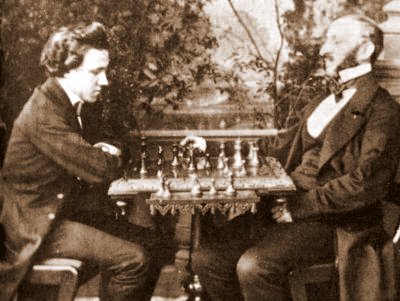As many visitors of this site may be interested in a biography of Paul Morphy, here’s a small summary of his life.
Early Life
Paul Charles Morphy was born on June 22, 1837, in New Orleans, Louisiana. His family was prominent and well-educated; his father, Alonzo Morphy, was a lawyer and a judge of the Louisiana Supreme Court, and his mother, Louise Thérèse Félicité Thelcide Le Carpentier, came from a wealthy French family. From a young age, Paul showed exceptional intellectual abilities. He learned chess by watching his father and uncle play, and by the age of twelve, he was already recognized as a chess prodigy. He had in particular beaten the Hungarian player Johann Löwenthal in casual games played in New Orleans in 1850.
Rise to Prominence
Morphy’s talent was evident early on, but his formal education was his family’s priority. He attended Spring Hill College in Mobile, Alabama, where he graduated in 1854 with a degree in mathematics and classical studies. He then went on to earn a law degree from the University of Louisiana (now Tulane University) in 1857. However, since he was not yet 21, he couldn’t practice law immediately and turned his focus to chess.
That same year, Morphy participated in the First American Chess Congress held in New York City. He won the tournament convincingly, beating Louis Paulsen in the final round, establishing himself as the best chess player in the United States. This victory brought him national fame and set the stage for his subsequent international success.
European Tour
In 1858, Morphy embarked on a grand tour of Europe, where he sought to challenge the best chess players of the continent. His journey began in England, where he played against and defeated several strong players, including Johann Löwenthal. The famous English player Howard Staunton, however, avoided a formal match against Morphy, a decision that remains controversial among chess historians.

Morphy then traveled to France, where he played and defeated many of the leading French chess masters in the very famous Café de la Régence. His most famous match was against Adolf Anderssen of Germany, who had won the first international chess tournament organized in London in 1851 and was considered the strongest player in Europe. Morphy won convincingly with a score of 7-2, including two draws. This victory established him as the unofficial world chess champion.
During his European tour, Morphy also engaged in several simultaneous exhibitions, including a memorable performance in Paris where he played eight opponents blindfolded, winning six games and drawing two. His ability to play without sight of the board astonished audiences and further cemented his legendary status.
During his trip to Europe, Paul Morphy was accompanied by an English journalist, Frederick Milnes Edge, who published a fascinating account of the journey in 1859.
Return to America and Retirement
Upon returning to the United States in 1859, Morphy was celebrated as a national hero. However, he was not interested in pursuing a professional chess career. He viewed chess as a gentleman’s pastime, not as a means of livelihood. Morphy attempted to establish a law practice in New Orleans, but his fame as a chess player overshadowed his legal career, and he struggled to attract clients who took him seriously.
Disillusioned with the world of competitive chess and facing difficulties in his professional life, Morphy gradually withdrew from public life. He refused to play chess for money and turned down offers for lucrative matches and exhibitions. His retreat from the chess world was so complete that by the early 1860s, he had effectively retired from the game.
Later Life and Legacy
Morphy’s later years were marked by increasing isolation and eccentricity. He lived quietly in New Orleans, primarily supported by his family’s wealth. Accounts from this period describe him as a recluse, although he maintained a circle of close friends and family.
Despite his brief career, Morphy’s impact on the game of chess was profound. He was known for his exceptional skill in open, tactical play, and his games are still studied today for their clarity and brilliance. Morphy’s understanding of positional play and his ability to think several moves ahead were ahead of his time, influencing future generations of players.
Paul Morphy passed away on July 10, 1884, at the age of 47. The official cause of death was a stroke, although some accounts suggest he may have been suffering from various health issues, both physical and mental, in his final years.
